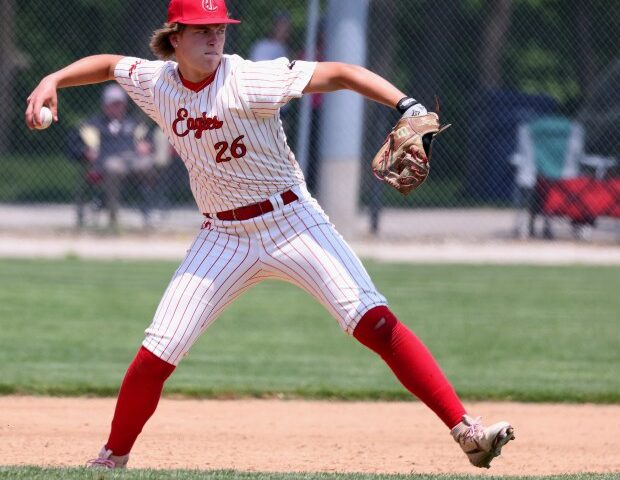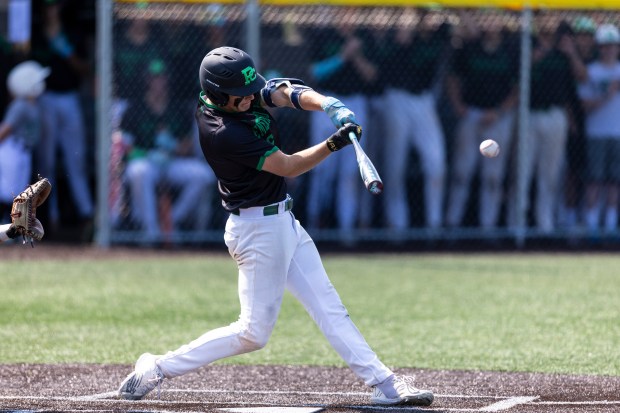Henry Otero, 12, a student at Waldo Middle School, joined a couple hundred of his classmates on a unique in-house field trip Wednesday morning at his school in Aurora where students learned a lesson about the uses and abuses of technology.
“I got the message about technology not being the answer to everything and kids are too tied to phones versus relationships,” Henry said after watching a play about the use of artificial intelligence in the classroom. “I learned through this performance more about that and it kept my interest. I enjoyed the music and the dancing.”
The newly-written play “Brighter Futures” was offered at the school through the Paramount Theatre and the Paramount School of the Arts in Aurora. The play, which recently “hit the road,” is being performed for free at local schools.
The one-hour production Wednesday included a cast and crew of nearly a dozen who helped tell the story about an app used to write papers for class.
A press release from the Paramount said that in the play, “after some argument as to the ethical implications, the app gains popularity through the entire school as a secret weapon. Futures are bright for everyone now dreaming of higher education, prestige and opportunity.”
The play, which was presented nearly a year ago to area educators through a script-only read-through, debuted last Monday at Cowherd Middle School in Aurora.
Before Wednesday’s performance at Waldo Middle School, Paramount Theatre Director of New Works and Associate Artistic Producer Kara Davidson said the first rollout of the play before a live audience led to some tweaks.
“The idea for this actually began back in 2019, so it’s taken a number of years to get things to this point,” she said. “We’re doing nine shows in the next two weeks. We learned a lot from having that many students in the room. Each performance will include about 300 students and so there is a piece of the puzzle you don’t know until you’re performing for the audience the play was intended for, so we’ve tweaked some things.”
Two of the three writers of the play were solicited by its eventual director to write the script, Davidson said, with the pair later asking a third writer to join them.
The play includes an original soundtrack written by the same trio as well as some extensive choreography.
Waldo Middle School Principal Eileen Roberts said it was great to have the play performed at the school.
“I think this is a great opportunity to have exposure both for the liberal arts where students can have theater and learn about speaking skills, but I also think it teaches them about having cultural exposure and see what a theater would be like if they went to the Paramount or another theater as well,” Roberts said.
“I love that the message is about technology because we deal with it daily and overall I think this is a great opportunity for our kids,” Roberts said. “It’s also a way for kids to learn how to act as an audience and how to listen and we’re inching them into it.”
Roberts said in terms of a follow-up, she hoped teachers would have students reflect on what they saw as well as discuss things like a career in theater and perhaps complete a writing assignment about the experience.
Cast member Laura Quinones, 25, of Chicago, who played the part of one of the best students in the school who led others to eventually reject technology, said it was great that the play is being staged at local schools.
“I think my favorite thing about this process is that we are reaching schools where the demographic is very, very diverse and our actors are very diverse as well, so it’s a kind of an opportunity to bring theater to these kids and show them this is something they can do,” she said.
“The message of ‘Brighter Futures’ is, honestly there are a lot of messages in this show,” Quinones said. “Mainly it’s the idea of don’t believe everything you see on the internet, believe the people in front of you because they’re more important. They are the ones that are going to keep you safe and keep you happy.”
Davidson said that “in the times we live in with information everywhere, especially electronic information, I hope our students decide for themselves what information to believe.”
“The presence of artificial intelligence in our world isn’t the be all, end all,” Davidson said in reference to the play. “My hope is kids will go home and have discussions with their parents about the same subject that we’re all thinking about – what are our responsibilities with technology and intelligence? Brighter futures are about what we make them, and there’s a scene about investing in friends and being kind and balancing kindness with honesty instead of spending so much time on apps or electronics.”
David Sharos is a freelance reporter for The Beacon-News.





